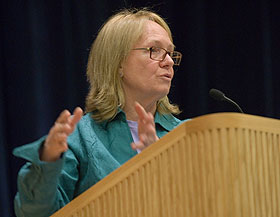  |
| HOME | THIS ISSUE | CALENDAR | GRANTS | BACK ISSUES | < BACK | NEXT > |
Speaker says efforts to reduce human trafficking ineffectiveby Sherry Fisher - November 26, 2007 | ||||
| An international monitoring project designed to combat human trafficking is flawed, according to Brown University anthropology professor Kay Warren. Warren made her remarks during this year’s Robert G. Mead Jr. Lecture, held in the Student Union Theatre on Nov. 8. The lecture, on human trafficking around the world, was part of the University’s celebration of International Week. Warren is the Charles B. Tillinghast Jr. ’62 Professor in International Studies at Brown, where she directs the Politics, Culture, and Identity Program at the Watson Institute for International Studies. She said a Trafficking in Persons program (TIP) was created by the U.S. State Department to measure countries’ levels of compliance with international norms in what are called TIP reports. However, she says, the TIP program lacks the measures needed for accurate results. She defined human trafficking as “the international recruitment and transportation of individuals, especially women and children, which involves some form of coercion with the goal of exploitation for financial gain.” Any form of labor could be the subject of trafficking, she said, but “in practice, there has been a much narrower understanding of trafficking, which focuses mostly on women and children and sexual exploitation.” The Colombia-to-Japan trade fits into this category. Women, mostly in their 20s, are recruited from Colombia to go to Japan for the country’s sex entertainment industry, she said. “That may range from anything from bar hostessing with no touching at all, to what would be regarded as coercive and violent sexual exploitation,” said Warren. “The TIP reports are widely circulated four-tier rankings designed to reward those judged to be in full compliance and to sanction those that fail both to recognize human trafficking and to embrace the global discipline combating this transnational crime,” Warren said. “My analyses show how state policies and practices in Colombia and Japan have reworked American standards in striking ways – being that these and other countries jockey to keep their U.S. State Department rankings high. It’s hysterical to watch in practice.”
She said that countries take the protocol and “try to change it with another national, domestic agenda. The protocol actually morphs in this process. It might, for instance, take on a new identity as an anti-immigrant vehicle. “Even as these countries are trying to play with this imposition from the U.S. government, they also want high rankings,” she said. “Everyone wants to be a tier 1.” Colombia, a source country for trafficking, has a high tier ranking, Warren said, noting that it is “working very hard to reform its morals.” Japan, on the other hand, through 2004, was ranked tier 2. “It hurt their reputation,” Warren said. “Japan is the second largest economy in the world. It’s a sophisticated place.” But it has been hard for Japan to move out of tier 2 status, Warren said: “Japan has a one billion dollar sex entertainment industry. It’s part of their corporate culture.” She said the global estimate of 600,000 to 800,000 trafficking victims each year has been used in government reports as a measure of a global tragedy, but asked, “Where did those numbers come from? There was no methodology.” She asked, “Is criminal disorder actually defeated by these anti-trafficking processes? It’s not clear to me. Anti-trafficking policies have had important effects on state policies through the legal system, but it’s unclear to me that they have had very effective consequences for transnational organized crime.” Added Warren, “The issue is: Would there be another way to measure, and another kind of methodology, that one could develop that would target the criminals?” |
| ADVANCE HOME UCONN HOME |

